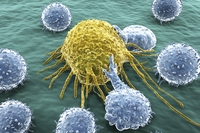In the same section
- Accueil
- EN
- Research
- Research projects
- Fédération Wallonie-Bruxelles
- "Actions de recherche concertées" (ARC)
-
Share this page
Research Project "AU-rich element (ARE)-mediated mRNA" (ARC program)
"Understanding the contribution of AU-rich element (ARE)-mediated mRNA decay to the maintenance of skin and gut immune homeostasis"

Epithelial barriers such as gut and skin are continuously exposed to environmental stimuli, including commensal and pathogenic microbes. It is essential for the host to control inflammatory processes in order to prevent infections and also avoid development of inflammatory diseases such as psoriasis or Crohn’s disease.
Previous researches from Stanislas Goriely’s lab have shown the role of Tristetraprolin (TTP) in the regulation of inflammatory processes. This protein controls the expression of key inflammatory mediators such as TNF-a and IL-23 by regulating mRNA decay. The present project evaluates the role of this molecule in the control of skin and gut homeostasis. For this purpose, the researchers will assess the relationship between TTP and inflammatory processes by using murine models and clinical samples. They will also evaluate the role of skin and gut microbiota in the development of this relationship. The study will also allow to develop novel transgenic tools in order to probe some mRNA decay in vivo.
Spokesperson
Stanislas Goriely
Institute for Medical Immunology
Faculty of Medicine
